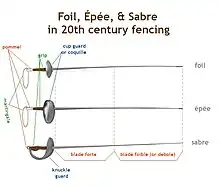debole
English

Diagram of fencing swords, indicating deboles on the right
Etymology
From Italian debole, meaning "weak", equivalent to the French 'foible.
Noun
debole (plural deboles)
- In light swords, such as rapiers and modern weapons in the sport of fencing: that flexible part of the blade nearer the tip, as opposed to the more rigid part nearer the hilt.
- 2021 Guy Windsor: The Complete Rapier
- There are two parts to the sword: the forte and the debole. The forte begins from the hilt, extending as far as the middle of the blade; and the remainder is called the debole. The forte is for parrying, and the debole for striking. This is really important because: if you always keep your forte in the way of the opponent's debole, you will never be hit.
- 2021 Guy Windsor: The Complete Rapier
Italian
Pronunciation
- IPA(key): /ˈde.bo.le/
- Rhymes: -ebole
- Hyphenation: dé‧bo‧le
Adjective
debole (plural deboli, superlative debolissimo)
Derived terms
Related terms
Further reading
- debole in Collins Italian-English Dictionary
- debole in Luciano Canepari, Dizionario di Pronuncia Italiana (DiPI)
- debole in Aldo Gabrielli, Grandi Dizionario Italiano (Hoepli)
- debole in garzantilinguistica.it – Garzanti Linguistica, De Agostini Scuola Spa
- debole in Dizionario Italiano Olivetti, Olivetti Media Communication
- debole in Treccani.it – Vocabolario Treccani on line, Istituto dell'Enciclopedia Italiana
Anagrams
This article is issued from Wiktionary. The text is licensed under Creative Commons - Attribution - Sharealike. Additional terms may apply for the media files.